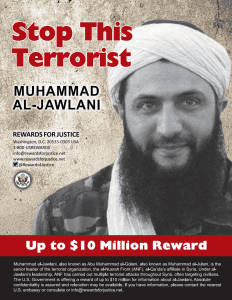A recently released UN report contains intriguing details concerning the dispute between Hay’at Tahrir al-Sham (HTS) and al Qaeda’s senior leaders, including the role played by two veteran operatives living in Iran.
The story is centered on four al Qaeda leaders who were detained inside Iran, but reportedly released as part of a hostage exchange in 2015. Two of the four — Abu Khayr al-Masri and Abu al-Qassam (a.k.a. Khalid al Aruri) — made their way to Syria, where they became directly involved in Al Nusrah Front’s controversial evolution into HTS.
The other two, Saif al-Adel and Abdullah Ahmed Abdullah (a.k.a. Abu Muhammad Al-Masri), have continued to operate inside Iran. While in Iran, the pair was asked to weigh in on Al Nusrah Front’s decision to “disassociate” itself from al Qaeda in July 2016. Adel and Abdullah rejected the move. And according to the new UN report, they set about undermining the stature of Al Nusrah’s and HTS’s leader: Abu Mohammed al-Jawlani.
Indeed, according to the UN, Adel and Abdullah are playing crucial roles — helping Ayman al-Zawahiri manage al Qaeda’s global network.
Citing information received from “Member States,” the UN says Zawahiri, “partly through the agency of senior Al Qaeda leadership figures based in the Islamic Republic of Iran…has been able to exert influence on the situation in north-western Syrian Arab Republic.”

These al Qaeda leaders include Adel and Abdullah, both of whom have long been wanted by the US government. On Aug. 8, the State Department increased the rewards offered for the two from $5 million to $10 million each. (See the graphic on the right.)
“Al Qaeda leaders in the Islamic Republic of Iran have grown more prominent, working with” Zawahiri and “projecting his authority more effectively than he could previously,” according to the UN.
Specifically, these Iran-based leaders have “influenced events in the Syrian Arab Republic, countering the authority of Abu Mohammed al-Jawlani…and causing formations, breakaways and mergers of various Al Qaeda-aligned groups in Idlib.”
Abu Mohammed al-Jawlani (or Abu Muhammad al-Julani) was the leader of Al Nusrah Front, which was an official and openly loyal branch of al Qaeda until July 2016. That month, however, Jawlani announced that Al Nusrah was rebranding as Jabhat Fath al-Sham (JFS) and wouldn’t have ties to any “external,” meaning foreign, entities. This ambiguous phrasing was intended to suggest a break from al Qaeda’s senior leadership, though an HTS spokesman would later argue that this wasn’t the intent — at least not at the time. Months later, in Jan. 2017, JFS merged with several other groups to form HTS — an ostensibly independent organization.
Abu Khayr al-Masri, then one of Zawahiri’s most senior deputies, explicitly approved Al Nusrah’s rebranding as JFS in July 2016. But he was killed in a US drone strike in Idlib in Feb. 2017, and his death may have contributed to the leadership squabbles that followed.
Despite Abu Khayr’s initial endorsement of the move, Jawlani’s repositioning became highly controversial within jihadist circles, with some al Qaeda veterans inside Syria objecting to Al Nusrah’s public distancing from al Qaeda. One of the men who objected to Al Nusrah’s relaunch was the aforementioned Abu al-Qassam (a.k.a. Khalid al Aruri), a former deputy to the founder of al Qaeda in Iraq.
That’s where Saif al-Adel and Abdullah (a.k.a. Abu Muhammad Al-Masri) came in. At some point, the matter was referred to the pair inside Iran. They rejected Al Nusrah’s so-called disassociation from al Qaeda.
One of Jawlani’s advocates, an HTS official known as Abu Abdullah al-Shami, argued that Adel and Abdullah didn’t have the authority to overrule Jawlani and his comrades because the two were “in an enemy state (Iran),” where “they are being held there against their will.” In other words, the two al Qaeda leaders were supposedly detained inside Iran and, therefore, not able to freely consider the matter.
But Abu al-Qassam quickly rejected Abu Abdullah al-Shami’s argument, explaining that Saif al-Adel and Abdullah “left prison and they are not imprisoned.” The two al Qaeda managers “are forbidden from traveling until Allah makes for them an exit,” Qassam wrote, but “they move around and live their natural lives except for being allowed to travel.”
That is, according to Abu al-Qassam, Saif al-Adel and Abdullah were free to make important decisions on behalf of al Qaeda’s management team even while living in Iran.
The UN’s report, dated July 27, 2018, confirms Abu al-Qassam’s testimony.
Citing intelligence from “Member States,” the UN says that Zawahiri has relied on Adel and Abdullah “to exert influence on the situation in north-western Syrian Arab Republic” and the two are “projecting his authority.”
Just as the UN reports, a number of “breakaway” jihadist groups have been formed since late last year, when the controversy over HTS boiled over. The UN presents this development as a deliberate part of the Iran-based al Qaeda leadership’s ruling.
The UN’s report also points to the role played by dissenters in Syria, especially Dr. Sami al-Uraydi and Iyad Nazmi Salih Khalil (also known as Iyad al Tubasi and Abu Julaybib). Both al-Uraydi and Khalil were briefly imprisoned by HTS last year. This only added to the infighting over Jawlani’s leadership, but it also led to a reconciliation initiative involving veteran jihadists, who negotiated the pair’s freedom.
The UN points to the formation of Ansar al-Din and Hilf Nusrat al-Islam as examples of the jihadist groups now operating outside of Jawlani’s control. FDD’s Long War Journal has a forthcoming analysis of Ansar al-Din, which was one of HTS’s original constituent groups. Ansar al-Din broke away from HTS in February, resuming its activities under its own leadership and brand, as they existed before HTS’s formation.
Hilf Nusrat al-Islam was formed when two other groups, the “Guardians of Religion” organization and Ansar al-Tawhid merged earlier this year. The “Guardians of Religion,” which is reportedly led by another al Qaeda veteran, Abu Hammam al-Shami, includes fighting factions that were part of HTS before breaking away.
HTS still in “contact” with al Qaeda’s leadership
Despite the vitriolic disagreements over HTS’s formation and Abu Mohammed al-Jawlani’s leadership, the UN says “Member States assess that HTS and its components still maintain contact with Al Qaeda leadership.”

Abu Muhammad al Julani, the leader of Hay’at Tahrir al Sham.
The UN also added this observation: “According to one Member State, HTS recently seized territories from Ahrar Al-Sham…and other armed groups after being reinforced by the arrival of military and explosives experts from al Qaeda in Afghanistan.” (Ahrar al-Sham is another group in Syria that has had al Qaeda veterans embedded in its ranks in the past.)
If this report is accurate, then al Qaeda has continued to support HTS’s operations.
In May, the US State Department amended its terrorist designation for Al Nusrah Front to include HTS as an “alias” for the group. State continued to describe Al Nusrah “as an al Qaeda affiliate” and warned that no one should be fooled by its “attempt to rebrand itself.” The UN followed suit in June, amending its own terrorist designation for Jawlani’s project and also describing HTS as an al Qaeda “affiliate.”
In its new report, the UN continues to refer to both Al Nusrah and HTS, pointing to its amended terror designation and saying Al Nusrah “is assessed to remain the controlling force within” the HTS umbrella. Jawlani is described as the leader of Al Nusrah and HTS. “Some Member States in the region view” Al Nusrah as a “menace as comparable to that of” the Islamic State, with both posing a threat to the international community, the UN warns.
Even so, the disputes over HTS’s establishment have been real.
The UN writes that Zawahiri has “signaled” his “dissatisfaction with some aspects of al-Jawlani’s leadership, especially his prioritizing of governance and the holding of territory over commitment to international terrorism.”
In fact, Zawahiri has repeatedly made his objections known, advising the jihadists in Syria to avoid any “nationalist” agendas, warning them that they can’t deceive America, and making it clear that he has not authorized anyone in Syria to abrogate their oaths of allegiance to him. These arguments were certainly aimed at Jawlani’s HTS.
Still, Zawahiri hasn’t disowned Jawlani — at least not publicly. And despite the al Qaeda-endorsed defections, the UN’s Member States think HTS “will hold together” with al Qaeda’s “core” and “other opposition groups” continuing to operate “in the area” as well.
Bashar al-Assad’s regime and his allies may launch an offensive in Idlib in the near future. If so, the UN’s member states think the jihadists, Islamists and other rebels will be ready for a fight. “All groups are expected to make a stand and fight any Syrian and international forces that attempt to dislodge them,” the UN writes.
It is for this reason that Zawahiri and other al Qaeda actors have continually preached “unity” within the rebellion. A fractured insurgency has little chance of withstanding a large-scale operation by Bashar al-Assad’s loyalists, along with their Russian and Iranian allies.
Note: The spellings of some words and names, including al Qaeda, were changed to make them consistent throughout.









2 Comments
So strange, fanatic suni’s living happily in shia Iran.
Translation of “Hilf Nusrat al-Islam” as “Guardians of Religion” organization is not a correct translation.
The correct is “Victory to Islam Alliance.”
Thanks